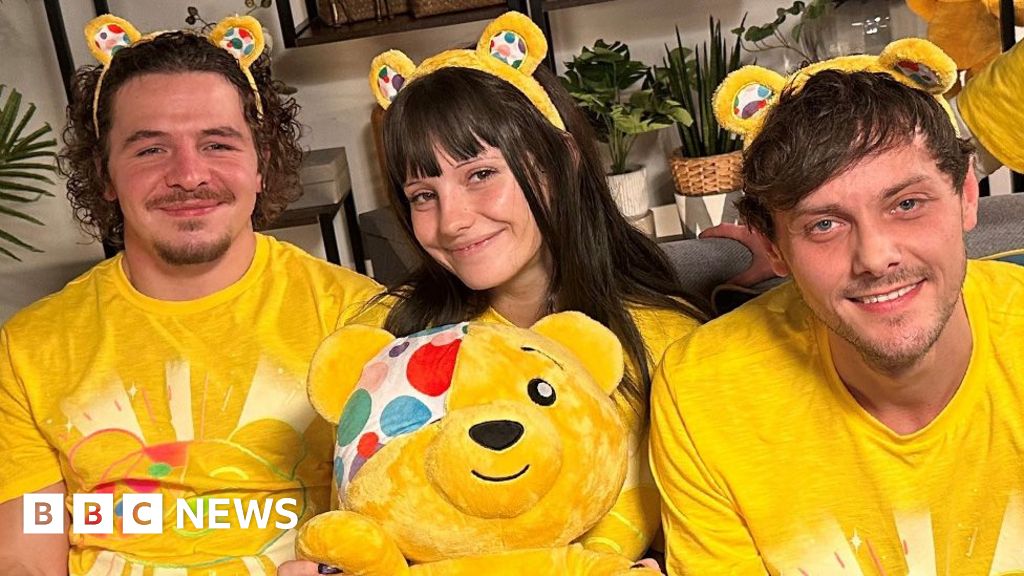ARTICLE AD BOX
By Charlotte Simpson
Newsbeat reporter
Image source, Chidera / The Slumflower
"It's something I wish more people would be sensitive towards, because you don't know why someone has lost their hair."
Instead of the films and actors that won, the 2022 Oscars will likely be remembered for Will Smith slapping comedian Chris Rock live on stage for making a joke about Jada Pinkett-Smith, his wife, and her hair loss.
"She could have summoned up so much bravery to leave the house that day and show up and be photographed," 27-year-old Chidera, who also suffers from hair loss, tells Radio 1 Newsbeat.
Chidera says the joke shows how society still discriminates against people with physical differences and how we don't think about the "implications of making fun of someone for having a condition beyond their control".
Will Smith apologised to the event organisers for striking the comedian, and later said sorry to Rock as well.
Los Angeles Police Department said no charges were being brought against Smith, but the Oscars film academy has launched a formal review into what happened.
Jada Pinkett-Smith has a condition called Alopecia areata, which is the medical term for hair loss.
It can be temporary or permanent and can range from having bald patches to losing all your hair.
It affects 1 in every 500 to 1,000 people, according to stats from the United States.
'Black beauty is derived from your hair'
Chidera, an influencer from London, has had traction alopecia since the age of seven, which is a different type to Jada's.
She says hers was caused through years of wearing heavy hair extensions and using relaxers - which are a chemical straighter often used to 'relax' naturally curly hair.
"It's resulted in pretty much permanent hair loss on a massive patch at the side of my head that's quite visible," she says.
"It's something that I find a bit embarrassing, but I'm learning to love it."
It's not been an easy journey to accept her condition because, like Jada at the 2022 Oscars, she's had jokes and comments made about her hair loss.
"It's something that's quite common in the black community, because being a black woman, your hair is where a lot of your beauty is derived from," she says.
"There's so much emphasis placed on you having laid edges and popping baby hairs, and when you have a bald patch, people look at you and think something's wrong with you almost like you've failed, because there's such a high standard."
'Walk with your head held high'
Yasmin, 29, has been completely bald for nine years.
She says Chris Rock's joke was "not cool and not funny", but says she brushes off any jokes or comment made towards her.
Image source, Yasmin
Image caption,Yasmin is worried about the pressures of social media to make everything look perfect
"People don't appreciate how much strength it takes to walk with your head held high every day," she says.
"It shows that society still has a long way to go with how they perceive baldness, and baldness in women.
"Because it is a thing, you know, and there's lots of us".
'I hid behind that wig'
Yasmin's hair started falling out when she was 15.
At first she tried a treatment involving 60 painful injections into her scalp, which was successful at first - but just before her 20th birthday, the rest fell out.
"We went straight and got a wig for me," she says. "I was so embarrassed."
"I couldn't deal with the fact that I'd have to ever show my bald head," she says.
"I hid behind that wig for three years."
Image source, Yasmin
Image caption,Yasmin thought she'd always want to wear a wig
Only Yasmin's closest friends and family knew about her alopecia and that she wore a wig.
"When people would bring up hair I'd get really nervous and I'd try and change the subject" She says.
"People used to compliment me [on my hair], and I used to find it so uncomfortable because all I wanted to say was 'I don't look like this'."
Image source, Getty Images
Image caption,Jada Pinkett-Smith wore a Jean Paul Gaultier dress at the 2022 Oscars
Jada Pinkett-Smith first revealed she had alopecia in 2018 during an episode of her talk show, Red Table Talk.
"It was terrifying when it first started. I was in the shower one day and then just handfuls of hair, just in my hands, and I was like 'oh my God am I going bald?' Jada said in the episode.
Hearing someone like Jada speak about hair loss gave Chidera "a sense of relief".
"She's not someone you'd ever think this kind of thing would happen to," she says.
'You're not just a bald patch'
Alopecia currently has no cure, and after years of trying various oils, creams and other treatment with little success, Chidera decided to embrace her hair loss.
She says experimenting with hairstyles that have "allowed her to feel empowered", as well as challenging herself to wear her hair in a way that exposes her bald patch, has helped her accept it.
"When you have a visible insecurity, you think that people see that before they see you. But most of the time people don't notice it," she says.
"And even if people do notice it, that's not the main thing about you that stands out, you're still a person with other facets and interesting things about you that add up to who you are."
"You're not just a bald patch," she says.
Like Chidera, Yasmin says that black women are set very high standards when it comes to their hair.
Image source, Yasmin
Image caption,Yasmin started losing her hair when she was 15
Yasmin's boyfriend at the time of her hair loss never saw her bald head.
"I used to wear a beanie in bed," she says.
She didn't tell her nan about the wig either.
"She was like 'you've lost it all, and your hair is your beauty'."
Although Yasmin says there's more to beauty than just hair, she says that for black women it's an important way to "show off your black culture" as well as "personal expression".
As a mixed race woman she says losing this ability to show her blackness felt like she was losing "part of my identity", especially because she struggled to find a wig "that represented my hair type and texture" .
"I look like her, I don't have any hair"
Yasmin has since fully embraced her baldness and rarely wears a wig now.
She recently took part in a photoshoot for a major UK department store, something she's proud she did for all the other bald women out there.
"Just to see someone in the media, or in a shop window, so they can be like 'oh I look like her, I don't have any hair'."
"I didn't have any of that when I was growing up."
Image source, Yasmin
Image caption,Yasmin has been part of modelling campaigns
Yasmin wishes there were more people like Jada Pinkett-Smith speaking out.
"For the younger generation, because there is so much pressure, especially around social media to look perfect," she says.
"Know what you look like, there's beauty in everyone, in everything," she adds.
"Just because a person sitting next to you has hair. Doesn't make you any less beautiful".

 2 years ago
25
2 years ago
25








 English (US)
English (US)